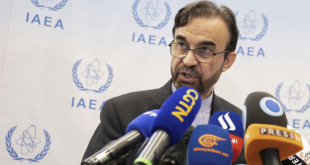 TEHRAN (FNA)- Iranian government has ordered the state oil company to deposit oil revenues only in selected banks, a move viewed as an effort to dodge toughening sanctions against Tehran.
TEHRAN (FNA)- Iranian government has ordered the state oil company to deposit oil revenues only in selected banks, a move viewed as an effort to dodge toughening sanctions against Tehran.
The state-run National Iranian Oil Company (NIOC) had been free to choose where to deposit the tens of billions of dollars Iran receives annually in earnings from its crude oil exports.
But a new government directive said the NIOC could now deposit the foreign currency only in foreign banks previously selected by the central bank.
“NIOC is from now on obliged to deposit 100 percent of crude oil export income in foreign bank accounts that are chosen by the Central Bank of Iran,” state television quoted the new government directive as saying on Saturday.
The order did not say on which criteria the foreign banks would be selected.
EU governments have pressured European financial institutions to cut their business with Iran as a way of pressuring the Islamic republic in the standoff over its nuclear program.
The West also wants Asian banks to loosen their traditionally close ties with Iran.
“This decision was made after the expansion of new rounds of sanctions against Iran so that Iran’s assets are not blocked in foreign banks,” the Sarmayeh newspaper quoted a source in oil ministry as saying.
The European Union and the United States have also imposed restrictions on the activities of Iran’s largest banks. These unilateral sanctions are running parallel to the three sets of sanctions agreed by the UN Security Council.
Oil exports are by far the biggest foreign currency winner for OPEC’s second largest exporter.
Thanks to record oil prices, Iran pocketed 29.5 billion dollars in the first four months of the current calendar year which began on March 20.
In June, western media reported Iran had been shifting tens of billions of dollars from European banks to other institutions, considering that any further sanctions would affect its access to investments. But, Iran rejected the reports.
Iran and West are locked in a standoff over Tehran’s progress in the field of civilian nuclear technology. The United States and its Western allies accuse Iran of trying to develop nuclear weapons under the cover of a civilian nuclear program, while they have never presented any corroborative document to substantiate their allegations. Iran denies the charges and insists that its nuclear program is for peaceful purposes only.
Tehran stresses that the country has always pursued a civilian path to provide power to the growing number of Iranian population, whose fossil fuel would eventually run dry.
Iran is under three rounds of UN Security Council sanctions for turning down West’s calls to give up its right of uranium enrichment, saying the demand is politically tainted and illogical.
Iran has so far ruled out halting or limiting its nuclear work in exchange for trade and other incentives, insisting that it will continue enriching uranium because it needs to provide fuel to a 300-megawatt light-water reactor it is building in the southwestern town of Darkhoveyn as well as its first nuclear power plant in the southern port city of Bushehr.
Iran has repeatedly said that it considers its nuclear case closed after it answered the UN agency’s questions about the history of its nuclear program.
 Eurasia Press & News
Eurasia Press & News


